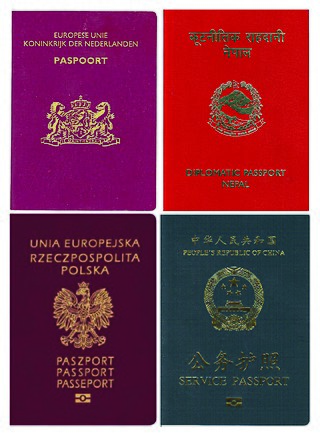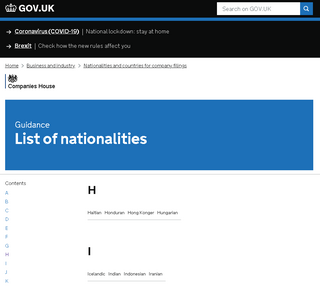
A passport is an official travel document issued by a government that contains a person's identity for international travel. A person with a passport can travel to and from foreign countries more easily and access consular assistance. A passport certifies the personal identity and nationality of its holder. It is typical for passports to contain the full name, photograph, place and date of birth, signature, and the issue and expiration dates of the passport. While passports are typically issued by national governments, certain subnational governments are authorised to issue passports to citizens residing within their borders.

The British colonization of the Americas is the history of establishment of control, settlement, and colonization of the continents of the Americas by England, Scotland and, after 1707, Great Britain. Colonization efforts began in the late 16th century with failed attempts by England to establish permanent colonies in the North. The first of the permanent English colonies in the Americas was established in Jamestown, Virginia, in 1607. Approximately 30,000 Algonquian peoples lived in the region at the time. Colonies were established in North America, Central America, South America, and the Caribbean. Though most British colonies in the Americas eventually gained independence, some colonies have remained under Britain's jurisdiction as British Overseas Territories.

The British Overseas Territories (BOTs) are the 14 territories with a constitutional and historical link with the United Kingdom that, while not forming part of the United Kingdom itself, are part of its sovereign territory. The permanently inhabited territories are delegated varying degrees of internal self-governance, with the United Kingdom retaining responsibility for defence, foreign relations and internal security, and ultimate responsibility for good governance. All of the territories are inhabited by civilians, except three that are chiefly or only inhabited by military or scientific personnel. All fourteen have the British monarch as head of state. These UK government responsibilities are assigned to various departments of the Foreign, Commonwealth and Development Office and are subject to change.

The term "British subject" has several different meanings depending on the time period. Before 1949, it referred to almost all subjects of the British Empire. Between 1949 and 1983, the term was synonymous with Commonwealth citizen. Currently, it refers to people possessing a class of British nationality largely granted under limited circumstances to those connected with Ireland or British India born before 1949. Individuals with this nationality are British nationals and Commonwealth citizens, but not British citizens.

The British Nationality Act 1981 (c. 61) is an act of the Parliament of the United Kingdom concerning British nationality since 1 January 1983.

British National (Overseas), abbreviated BN(O), is a class of British nationality associated with the former colony of Hong Kong. The status was acquired through voluntary registration by individuals with a connection to the territory who had been British Dependent Territories citizens (BDTCs) before the handover to China in 1997. Registration for BN(O) status was limited to the 10-year period preceding the transfer as a transitional arrangement for former BDTCs; current residents cannot newly acquire this nationality.

A British Overseas citizen (BOC) is a holder of a residual class of British nationality, largely held by people connected with former British colonies who do not have close ties to the United Kingdom or its remaining overseas territories. Individuals with this form of nationality are British nationals and Commonwealth citizens, but not British citizens. BOCs are subject to immigration control when entering the United Kingdom and do not have the automatic right of abode there or in any British overseas territory.
The right of abode is an individual's freedom from immigration control in a particular country. A person who has the right of abode in a country does not need permission from the government to enter the country and can live and work there without restriction, and is immune from removal and deportation.

Belonger status is a legal classification normally associated with British Overseas Territories. It refers to people who have close ties to a specific territory, normally by birth or ancestry. The requirements for belonger status, and the rights that it confers, vary from territory to territory.

The Hong Kong Special Administrative Region Passport is a passport issued only to permanent residents of Hong Kong who also hold Chinese citizenship. In accordance with the Basic Law of the Hong Kong Special Administrative Region, since the handover in 1997, the passport has been issued by the Immigration Department of the Government of Hong Kong under the authorisation of the Central People's Government of the People's Republic of China. As the official languages of Hong Kong are Chinese and English, the passport is printed bilingually in both Chinese and English. In addition, unlike Chinese passport which can be issued by Chinese diplomatic missions abroad, the Immigration Department of Hong Kong is the only issuing authority for HKSAR passports.

British nationality law as it pertains to Hong Kong has been unusual ever since Hong Kong became a British colony in 1842. From its beginning as a sparsely populated trading port to today's cosmopolitan international financial centre and world city of over seven million people, the territory has attracted refugees, immigrants and expatriates alike searching for a new life.

A British passport is a travel document issued by the United Kingdom or other British dependencies and territories to individuals holding any form of British nationality. It grants the bearer international passage in accordance with visa requirements and serves as proof of citizenship. It also facilitates access to consular assistance from British embassies around the world. Passports are issued using royal prerogative, which is exercised by His Majesty's Government; this means that the grant of a passport is a privilege, not a right, and may be withdrawn in some circumstances. British citizen passports have been issued in the UK by His Majesty's Passport Office, an agency of the Home Office, since 2014. All passports issued in the UK since 2006 have been biometric.

This article concerns the history of British nationality law.

A British Overseas Territories citizen (BOTC), formerly called British Dependent Territories citizen (BDTC), is a member of a class of British nationality granted to people connected with one or more of the British Overseas Territories.

The right of abode (ROA) is an immigration status in the United Kingdom that gives a person the unrestricted right to enter and live in the UK. It was introduced by the Immigration Act 1971 which went into effect on 1 January 1973. This status is held by British citizens, certain British subjects, as well as certain Commonwealth citizens with specific connections to the UK before 1983. Since 1983, it is not possible for a person to acquire this status without being a British citizen.

Visitors to the United States must obtain a visa from one of the U.S. diplomatic missions unless they are citizens of one of the visa-exempt or Visa Waiver Program countries.

The Gibraltar variant British passport is a British passport issued to British Citizens and British Overseas Territory Citizens who work or live in Gibraltar. Having Gibraltarian status alone, without being resident in Gibraltar, is insufficient to obtain a Gibraltar Passport. Gibraltar passports are issued by the Passport Office of the Gibraltar Civil Status and Registration Office. Since 2005, passports issued in Gibraltar have been biometric.

The visa policy of Hong Kong deals with the requirements in which a foreign national wishing to enter Hong Kong through one of the 15 immigration control points must meet to obtain an entry permit or Visa, which depending on the traveller's nationality, may be required to travel to, enter, and remain in the Hong Kong Special Administrative Region. Visitors from over 145 countries are permitted without Visa entry for periods ranging from 7 to 180 days, to the Hong Kong Special Administrative Region for tourism or certain business-related activities. All visitors must hold a passport valid for more than 1 month.

The British National (Overseas) passport, commonly referred to as the BN(O) passport, is a British passport for people with British National (Overseas) status. BN(O) status was created in 1987 after the enactment of Hong Kong Act 1985, whose holders are permanent residents of Hong Kong who were British Overseas Territories citizens until 30 June 1997 and had registered as BN(O)s.

The British Overseas Territories maintain their own entry requirements different from the visa policy of the United Kingdom. As a general rule, British citizens do not have automatic right of abode in these territories.














